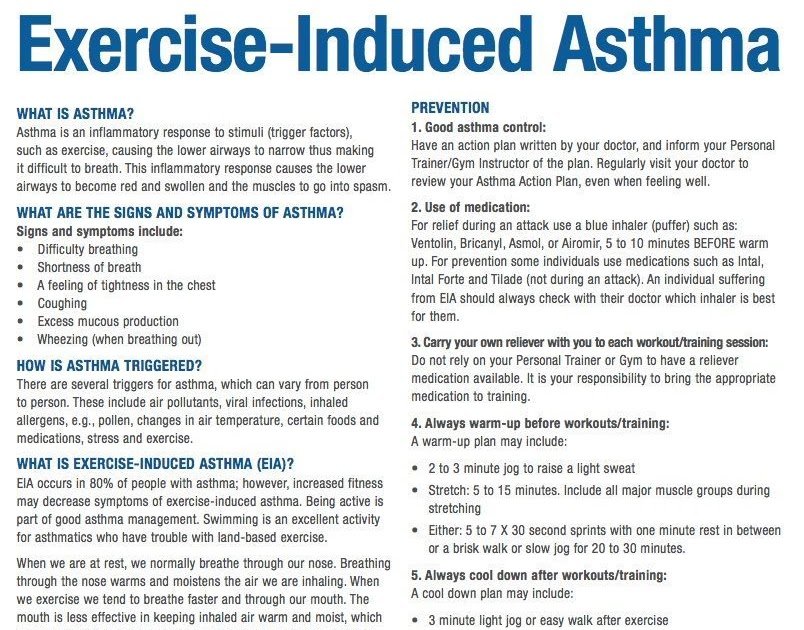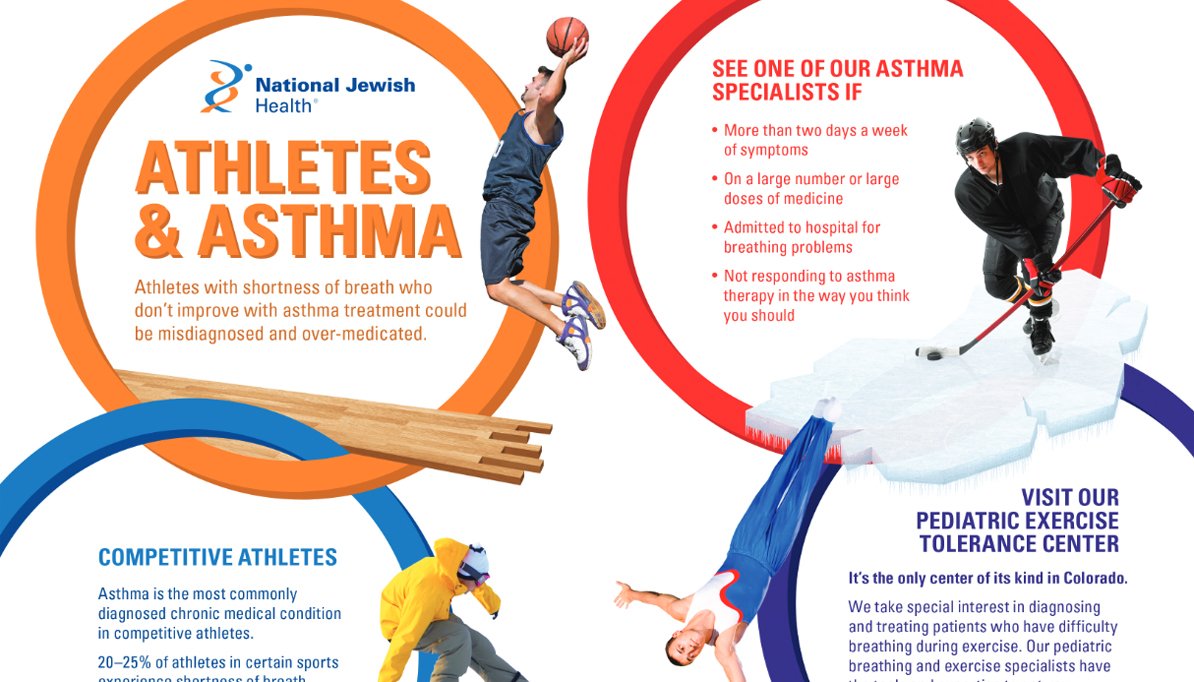How Common Is Exercise
Up to 90% of people with asthma, 50% of competitive athletes, and up to 26% of school children experience EIB.
EIB is one of the first symptoms to appear in people with asthma who are not being treated adequately. This means you may not be on the right medication or using it properly. Check with your doctor.
If you have been diagnosed with asthma and find your symptoms worsening especially if they appear shortly after you exercise, then this may be an early warning sign that your asthma may be getting worse or you may need your medications reviewed by your doctor.
If exercise is causing asthma symptoms, always speak to your doctor about this.
Questions To Ask Your Doctor
- I have trouble breathing when I exercise? Do I have EIB?
- How does EIB differ from regular asthma?
- Is it safe for me to exercise? What kinds of exercise can I do?
- Are there medicines I can take to prevent and treat my symptoms?
- How long do I have to take the medicines and what are the side effects?
- Are there other lifestyle changes I can make to relieve my symptoms?
- Will I always have EIB or can it go away?
Why Exercise Can Be A Trigger
Breathing through the nose warms up the air we breathe in. But when we exercise, particularly exercise that is more strenuous like running, we usually breathe through the mouth instead of the nose. This means were breathing in air thats colder and drier than normal.
If you have asthma, breathing in this cold, dry air causes your airways to tighten and get narrower. This can trigger your asthma symptoms like coughing, wheezing, and breathlessness.
You may come across other triggers when you exercise too, like pollution or pollen if you exercise outside, or dust if you exercise indoors. Chlorine in swimming pools can also trigger symptoms for some people.
Youre more likely to get asthma symptoms when you exercise if:
- you dont take your preventer inhaler every day as prescribed
- your airways are already tight and inflamed because of allergies or other triggers like cigarette smoke
Exercise-induced asthma
Rarely, someone not diagnosed with asthma might get asthma-like symptoms from exercising.
This is often called exercise-induced asthma, but a better term is exercise-induced bronchoconstriction because it is not caused by having asthma. However, its important to be assessed for asthma if you have symptoms of EIB.
Bronchoconstriction is when the airways get tighter and narrower as a result of strenuous exercise, particularly if someone is also breathing in cold air.
Find out more about exercise-induced asthma/bronchoconstriction.
Also Check: Are Chihuahuas Good For Asthma
You Live In A Cold Or Dry Environment
EIB occurs when you breathe in air that is drier and cooler than the rest of your body, which is what happens when you inhale through your mouth while exercising, explains Dr. Ogden. This type of air is a common trigger that makes your airways narrow. If the climate you live in is particularly cold or dry, your lungs are definitely more at risk.
What Are The Symptoms Of Exercise

Symptoms can range from mild to severe. They can appear a few minutes after you start exercising or after you finish a workout. Symptoms usually start to improve after about 30 minutes of rest.
Sometimes, exercise-induced asthma can return up to 12 hours after youve finished exercising. They can appear even when youre at rest. These are called late-phase symptoms. It may take up to a day for late-phase symptoms to go away.
Symptoms of asthma triggered by exercising include:
- Coughing after running or exercising.
- Severe fatigue.
Read Also: Remedies For Asthma Attack Without Inhaler
You Struggle To Run Long Distances
Do you enjoy going for 10-mile runs? That will change if you develop exercise-induced asthma. The deep breathing that running requires, plus the sheer distance, can decrease your endurance if your airways are constricted. Youre not going to be able to run as long or as far, Dr. Ogden says. Your symptoms will kick in before the runnings over and youll find yourself struggling. In that situation, meds or an inhaler can help you power through runs from a 5K to a marathon Here are some training tips for beginners who want to run a marathon. Regardless of your symptom or your environment, seeing an asthma and allergy specialist for an evaluation will set you on the road to relief.
What Types Of Medicines Treat Or Prevent Eib
There are three types of medicines to prevent or treat the symptoms of EIB. Your health care provider can help you find the best treatment program for you based on your asthma history and the type of activity.
- Short-acting beta agonist / bronchodilator : This medication can prevent symptoms when taken 10 to 15 minutes before exercise. It will help prevent symptoms for up to four hours. This same medication can also treat and reverse the symptoms of EIB should they occur.
- Long-acting bronchodilator: This needs to be taken 30 to 60 minutes before activity and only once within a 12-hour period. Salmeterol can help prevent EIB symptoms for 10 to 12 hours. This medication is for preventing symptoms. It does not offer any quick relief, so it not for treating symptoms once they begin.
- Mast cell stabilizers: Cromolyn sodium or nedocromil sodium need to be taken 15 to 20 minutes before exercise. These medications may also help to prevent the late phase reaction of EIB that some people experience. These medications are only for preventing EIB because they do not relieve symptoms once they begin. Some individuals use one of these medicines in combination with a short-acting bronchodilator.
If you have frequent symptoms with usual activity or exercise, talk to your doctor. An increase in your long-term control medications may help. Long-term control medicines, such as inhaled steroids, can help EIB.
Don’t Miss: Late Onset Asthma Elderly
Children’s Allergies: 5 Ways You Can Keep Your Child From Becoming Allergic
As many as 40 percent of children in the United States are allergic to something. While most allergies are mild, some can be severe and may prove to be life-threatening. Typically, children develop allergies within their first two years of life. What you do during those vital first few months plays a huge role in allergy development.
Exposing your children to certain substances may even help your child avoid allergic reactions later in life. Following are five ways you can keep your child from developing allergies.
What Type Of Sports Are Best For People With Asthma
Some types of exercise cause fewer asthma symptoms than others.4 Sports that require bursts of energy are easier on the lungs than distance events. Examples include football, baseball, wrestling, or sprinting. Recreational activities such as walking or hiking are also good options. Swimming might be a good choice since the air is humid and warm. However, some people are irritated by chlorine byproducts.
If you enjoy endurance events such as running or cycling, or very active sports like soccer or field hockey, work with your health care provider to find a treatment that works for you. Cold-weather sports, such as skiing, ice-skating, or hockey, can be challenging for people with asthma. Cold air often triggers asthma symptoms, but wearing a scarf, face mask, or special heat-exchange mask over your mouth and nose can warm and humidify the air.3,4
Read Also: Does Weight Gain Make Asthma Worse
How Can I Manage And Treat My Eib
With proper management, you can enjoy exercise and achieve your full potential. Proper management requires that you:
- Take steps to prevent symptoms
- Take medicine before exercising
- Do a proper warm up for 6 to 10 minutes before periods of exercise or vigorous activity
- Carefully watch your respiratory status before, during and after exercise
Children With EIB Inform teachers and coaches if you have a child with EIB. Kids with EIB should be able to take part in activities they just may need medication before an activity.
Athletes With EIB If you are an athlete, disclose your medicines and adhere to standards set by the U.S. Olympic Committee. Request a list of approved and prohibited medications from the Committee hotline at 1-800-233-0393.
Consult Your Doctor And Trainer
If youre just starting out to get fit, make sure to talk about your decision with your doctor. Together, youll be able to determine what types of exercises are actually beneficial and safe for you to do. The doctor will also tell you when and how to use your medicine and also recommend some lifestyle changes. Its important that you stick to those if you want to transform your body. Also, make sure to let your trainer know about your respiratory issue. That way, youll have additional help with your training sessions and a professional trainer can even create an exercise program that would suit your needs the best.
You May Like: Can You Join The Marines If You Have Asthma
Contact Doctor During Office Hours
- Donât have written asthma action plan from your doctor
- Use an inhaler, but donât have a spacer
- Miss more than 1 day of school per month for asthma
- Asthma limits exercise or sports
- Asthma attacks wake child up from sleep
- Use more than 1 inhaler per month
- No asthma check-up in more than 1 year
- You have other questions or concerns
How To Get In Shape With Exercise

December 22, 2016 by Elise Morgan
People who suffer from exercise-induced asthma often have an aversion to any type of exercise. But, as we all know, having no physical activity whatsoever is really damaging to ones health. Therefore, its important to clear the misunderstanding. Even though you suffer from asthma, you can and you should stay physically active. If you take your medicine regularly and follow a specific workout plan, theres no end to benefits that you can get from exercising. So, dont treat your asthma as an excuse to never get in shape. Where theres a will, theres a way.
You May Like: Is Asthma Worse At Night
Indoors May Be Better
Not all people with asthma have to avoid outdoors during their workouts, but its true that some asthmatic cases can get worse when exposed to pollen. Therefore, the safest bet is to avoid exercising outside at least during the pollen season. The same goes for air pollution, which is generally highest during colder months, but still very difficult to predict throughout the year, too. But sometimes, even the air indoors can become too dry and hurtful for asthmatic patients. Proper air humidifiers can really help as well as technologically advanced gadgets such as resmed airsense 10 elite device that deliver optimal temperature and humidity with a press of a button.
Signs That Exercise Is Triggering Your Asthma Symptoms
Whether youre out for a run, playing team sports, or cycling to work, dont ignore important signs like:
- needing to use your reliever inhaler
- stopping to catch your breath.
Exercise or allergy?
- If exercise is the trigger, you might notice symptoms coming on after youve exercised. You may need about 30-60 minutes to recover.
- If an allergy is the trigger, , you might notice symptoms during exercise.
Normal exercise symptoms or asthma symptoms?
Its normal to breathe faster or more deeply when we do any strenuous exercise, whether thats Zumba or running up the stairs.
So how can you tell if youre breathless because of the exertion or because your asthma symptoms are flaring up?
Look out for these asthma signs:
- Feeling very short of breath, or like you cant breathe enough air in
- Coughing
- Wheezing
- A tight feeling in your chest.
If you have any of these symptoms when you exercise, see your GP to review your asthma.
Always carry your reliever inhaler
Always have your blue reliever inhaler with you so you can quickly deal with asthma symptoms or an asthma attack. Call 999 if your reliever inhaler is not helping.
Recommended Reading: Can You Join The Army If You Have Asthma
How To Treat Exercise
If left untreated, exercise-induced bronchoconstriction can pose serious health risks. And it can seriously mess with your workout, too: EIB might also impact how fast or how long you can run. So getting it treated is important.
There are medications and lifestyle changes that can treat exercise-induced bronchoconstriction. On the meds side, a short-acting inhaler can help smooth the muscle cells of the airways, allowing the airways to open and dilate, explains Wang. You take it five to 15 minutes before exercise and the medication helps for a few hours.
If the problems persist or the inhaler doesnt help? Docs can also prescribe a daily, longer-acting inhaler with steroids, which prevent inflammation and swelling or a daily asthma pill, Wang says.
But lifestyle changes are also important, too. Adjusting your running environment based off of triggers can help sidestep flare-ups. If its cold, wear a face mask or cover your mouth and nose with a scarf to warm the air, Wang suggests. Breathe through your nose, tooits better at filtering the air than your mouth is. And if its simply too cold, take your run indoors.
Have pollen allergies? Check the pollen count, and know that dry, windy days tend to be worse than rainy ones. Pollution from big cities and cars can also irritate your breathing, so, when possible seek a more natural environment.
What Else Can I Do To Help With My Exercise
As well as seeing your doctor, and taking medication as prescribed the following suggestions may help some people with EIB manage their symptoms:
- Warming up before exercise
- Being as fit as possible increasing fitness raises the threshold for EIB, so that moderately strenuous exercise may not cause an attack.
- Exercising in a warm and humid environment
- Avoiding environments with high levels of allergens, pollution, irritant gases or airborne particles.
- Breathing through the nose to help warm and humidify the air
- Using a mask to filter air, although this may be impractical or can make breathing harder
- After strenuous exercise doing cooling down exercise, breathing through the nose and covering the mouth in cold, dry weather
- If you smoke cigarettes, consider speaking to your doctor about quitting.
Also Check: Is Weed Good For Asthma
Why Does Exercise Trigger Asthma
During normal breathing, the air we take in is first warmed and moistened by the nasal passages. Because people tend to breathe through their mouths when they exercise, they are inhaling colder and drier air.
In exercise-induced asthma, the muscle bands around the airways are sensitive to these changes in temperature and humidity and react by contracting, which narrows the airway. This results in symptoms of exercise-induced asthma, which include:
- Unusual fatigue while exercising
- Shortness of breath when exercising
The symptoms of exercise-induced asthma generally begin within 5 to 20 minutes after the start of exercise, or 5 to 10 minutes after brief exercise has stopped. If you are experiencing any of these symptoms with exercise, inform your doctor.
Preparing For Cardio Exercise
Don’t Miss: Can Acid Reflux Cause Asthma
What About Taking Medications If Im Involved In Competitive Sport
For elite, professional, and semi-professional athletes this is a very significant concern as the issue of drugs in sport and any medications or supplements you take, may have serious implications.
Many sporting bodies require elite, professional, and semi-professional athletes to provide evidence of EIB, such as Bronchial Challenge Test results before they are permitted to use EIB medicines during competition. So for any athlete competing at this level before you take any medication or supplement, even if prescribed by your doctor, you must always check with:
The Australian Sports Anti-Doping Authority 13 000 ASADA www.asada.gov.au
The World Anti-Doping Agency www.wada-ama.org
Use Your Inhaler Before Exercising If Your Asthma Is Brought On By Exercise

Physical activity is just as important in people with asthma as it is in people without asthma, so talk to your doctor if asthma limits you from doing exercise. Symptoms include coughing, wheezing, chest tightness or unexplained shortness of breath during exercise.
The most effective way to combat exercise-induced asthma is to use your inhaler before exercise. Relievers will prevent exercise-induced asthma in most people however, some people may also need additional protective treatments, including long-term control medication. Warm-up periods and a scarf worn over the mouth if it is cold may also help prevent symptoms.
Recommended Reading: How To Relieve Asthma Without Inhaler
